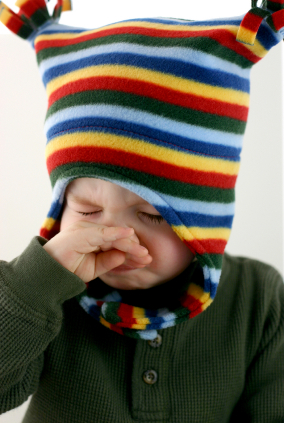
No parents send their children to day care or preschool just so they can come home with a runny nose, scratchy throat and a fever. But it happens, and in most cases, it's not a bad thing.
In the same way preschoolers must learn to play with others, recognize numbers and recite the alphabet, their immune systems must learn to resist the viruses that cause colds. It just so happens that day-care centers and preschools provide a perfect environment for that to occur.
"None of the kids know how to wipe their noses very well and they're touching everything," says Jeannette Harris, a certified infection control professional at MultiCare Health System in Tacoma. "They're coughing and sneezing. They're just juicy. They're constantly shedding viruses all the time. That's how viruses get spread."
Sounds yucky, but in the long run, it can be beneficial. A University of Arizona study published in 2002 concluded that children ages 6-11 who had previously spent time in large day cares or preschools (those caring for more than five unrelated children) suffered fewer colds than those who were cared for at home.
The trade-off
Of course, there's a flip side. Children who attend large day cares and preschools experience more colds earlier in their lives. It's a trade-off, for sure, but by developing greater resistance to cold viruses when they're younger, children are less likely to stay home sick as often when they begin school.
The key words are "as often." Since there are so many cold viruses -- and they mutate so fast -- it's impossible to develop resistance to them all.
How viruses work
Viruses are a type of antigen, the scientific term for any foreign substance that triggers a response from the body's immune system. Viruses are dormant until they find their way into a living cell. Once inside, the tiny particles cause cells to abandon their ordinary work and do nothing but begin production of more virus particles. The symptoms of a cold -- fever, runny nose, sneezing -- represent the body's effort to eliminate the particles before they can cause a dangerous infection.
There's more to it than that, however. Antigens that cause disease are called pathogens. In the process of fighting a pathogen for the first time, the body develops antibodies against that particular pathogen. If the same pathogen ever strikes again, the antibodies will, if all goes according to plan, neutralize it before it can do any damage or trigger major symptoms. That's how humans acquire immunity to various diseases: one pathogen at a time.
Newborns get a free ride. They inherit their mother's antibodies. However, the protection provided by maternal antibodies is short-lived. Within a few months, babies must begin to build their own antibodies. "They have a [complete] immune system," says Harris. "They just haven't been exposed to a lot yet."
Too few germs?
The buzz lately is that maybe today's children are experiencing too little contact with germs, the viruses and bacteria that cause infection but also help children build a strong immune system. "There's a lot of discussion out there about whether we're trying to keep kids too clean," says Harris. Another factor: "It used to be we had large families where kids were exposed to a lot more things."
In wealthy Western countries, antibiotics, clean homes -- even indoor plumbing -- all add up to fewer childhood infections. Generally speaking, that's a good thing. But the so-called "let them eat dirt" theory says that this limited exposure to germs has led to increases in certain autoimmune and allergic conditions, such as Crohn's disease and asthma.
And experts say moderate exposure to germs early in life trains the immune system to respond properly later in life, helping to ensure that it doesn't greet an antigen by overreacting (as in allergies) or attacking the body itself (as in autoimmune diseases).
In the last few years, researchers have focused on the connection between the lack of exposure to certain bacteria in childhood and increased rates of asthma. A study under way in Australia is testing the effectiveness of a "dirt pill" containing different strains of bacteria that a group of children ages 7-12 were not exposed to earlier in childhood.
The thinking is that the immune system of these children failed to develop correctly, leaving them vulnerable to asthma and other allergic conditions. Researchers will monitor the frequency and severity of asthma attacks in the children who take the dirt pill versus those receiving a placebo.
While the study has merit, "I wouldn't encourage people to let their children eat dirt," says Harris. Likewise, none of this is meant to suggest that exposing children to disease is an acceptable alternative to building immunity through childhood vaccinations. "The world today has some pretty serious pathogens out there," she says. "Vaccinations are the number one reason kids are as healthy as they are today."
Brad Broberg is a freelance writer and former newspaper reporter/editor who lives in Federal Way with his 12-year-old daughter, Rachel.
Originally published in the May, 2007 print edition of ParentMap.











